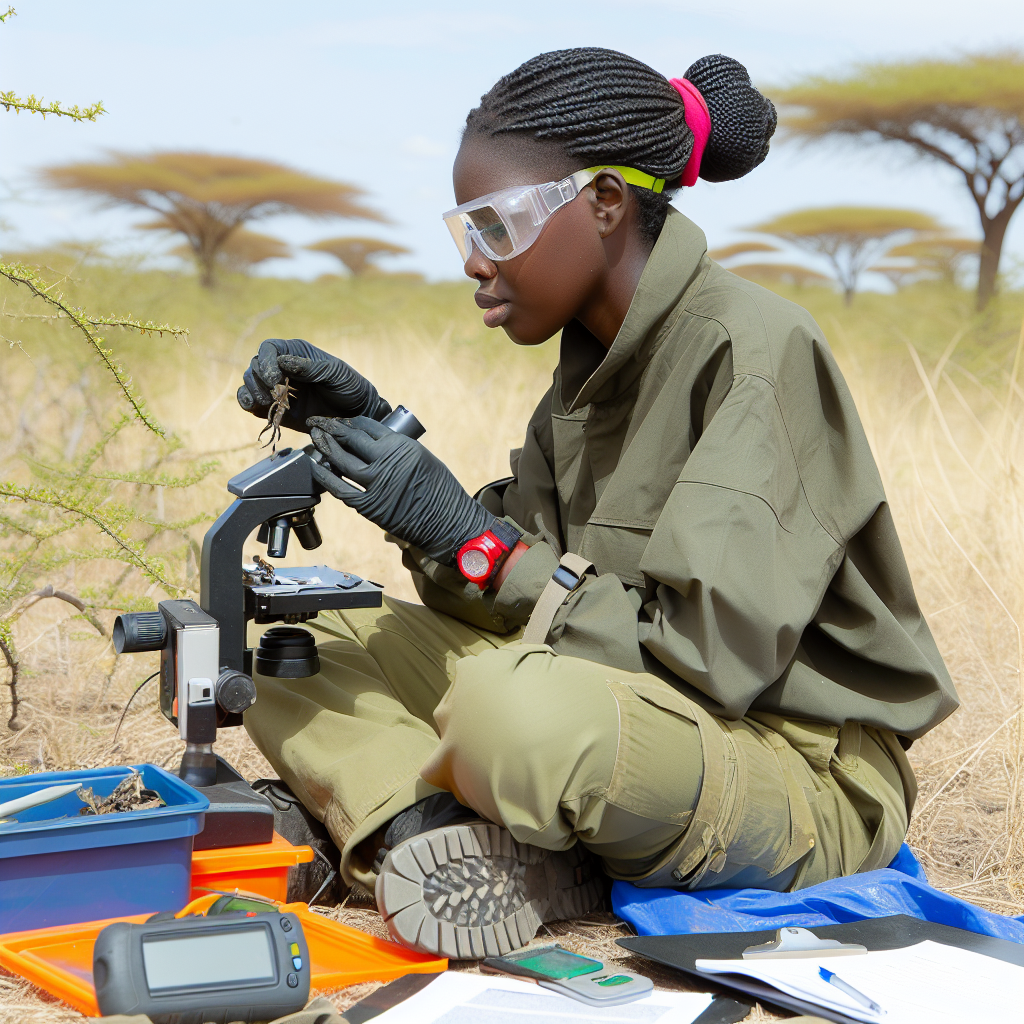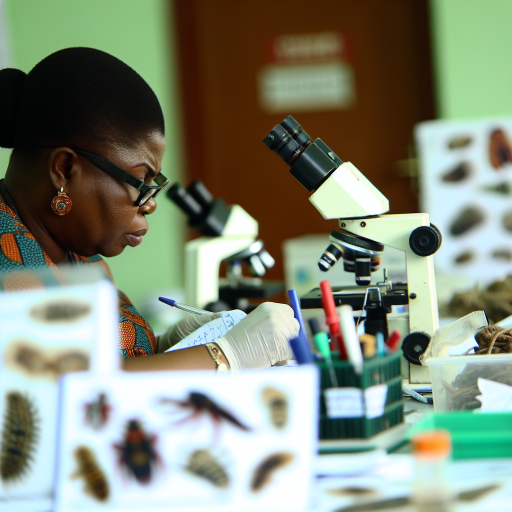Animal and Environmental Biology Student Experiences
Studying animal and environmental biology in Nigeria is crucial due to the diverse ecosystem and rich biodiversity present in the country.
Objectives of this blog post are to highlight student experiences, challenges faced, practical training opportunities, and potential career paths.
Student Experiences
Students in animal and environmental biology programs often engage in fieldwork to study animals in their natural habitats.
Challenges Faced
One of the major challenges is the lack of funding for research projects and inadequate laboratory facilities.
Practical Training Opportunities
Students have the opportunity to work with environmental agencies, wildlife conservation organizations, and research institutions during their studies.
Potential Career Paths
Graduates can pursue careers as wildlife biologists, environmental consultants, park rangers, or conservation officers in various governmental and non-governmental organizations.
The experiences gained by animal and environmental biology students in Nigeria contribute to their holistic understanding of biodiversity conservation and ecosystem management.
Overview of Animal and Environmental Biology Program:
In the Animal and Environmental Biology program, students undertake a comprehensive study of living organisms and their ecosystems.
This interdisciplinary field combines aspects of biology, ecology, environmental science, and conservation.
Curriculum and Courses:
- Students in this program typically take courses in biology, ecology, genetics, wildlife management, and conservation biology.
- Other courses may include environmental policy, field methods in ecology, ornithology, herpetology, and marine biology.
- Students also learn about environmental impact assessments, ecosystem dynamics, and natural resource management.
Importance of Hands-on Fieldwork and Research:
Hands-on fieldwork and research are integral components of studying animal and environmental biology.
This experiential learning allows students to apply theoretical knowledge in practical settings and develop essential skills.
- Fieldwork provides students with unique opportunities to observe wildlife in their natural habitats and conduct research projects.
- Through field studies, students learn about biodiversity, ecological interactions, and conservation strategies firsthand.
- Research projects enable students to collect and analyze data, conduct experiments, and contribute to scientific knowledge in the field.
Career Paths for Graduates:
Graduates of the Animal and Environmental Biology program are well-equipped to pursue diverse career paths in various fields related to biology, ecology, conservation, and environmental science.
- Some graduates may choose to work as wildlife biologists, environmental consultants, park rangers, or conservation officers.
- Others may opt for careers in research institutions, government agencies, non-profit organizations, or private companies focused on conservation and sustainability.
- Graduates may also pursue advanced degrees in specialized areas such as wildlife biology, environmental policy, or ecology to further their knowledge and expertise.
Challenges Faced by Students:
- Discussion on the lack of resources and modern equipment in most Nigerian universities.
- Highlighting the difficulties in conducting research and fieldwork due to limited funding.
- Addressing the issue of inadequate mentorship and guidance for students in this field.
As an Animal and Environmental Biology student, one of the major challenges faced by students in this field is the lack of resources and modern equipment in most Nigerian universities.
This lack of resources hinders students from gaining hands-on experience and conducting practical experiments that are essential for their learning.
Due to limited funding, students often find it challenging to conduct research and fieldwork.
Without proper financial support, they are unable to explore different research areas, collect data, and analyze findings effectively.
This limitation significantly affects the quality of their academic work and overall learning experience.
Another significant challenge is the inadequate mentorship and guidance provided to students in the Animal and Environmental Biology field.
Many universities in Nigeria lack experienced faculty members who can offer proper guidance and support to students.
As a result, students struggle to navigate their academic journey and make informed decisions about their career paths.
Addressing these challenges is crucial for enhancing the quality of education in the Animal and Environmental Biology field.
By investing in resources, providing adequate funding for research, and improving mentorship programs, Nigerian universities can better support students and prepare them for successful careers in this field.
Explore Further: Chemical Engineering vs. Chemistry Degrees
Fieldwork Experiences:
One student, Jane, shared her experience conducting fieldwork in Nigeria.
She recalled the thrill of observing wildlife in their natural habitats.
Challenges included dealing with harsh weather conditions and navigating remote locations.
Despite the difficulties, the rewards of witnessing animal behavior up close were invaluable.
Another student, Mark, talked about studying primates in the rainforest.
He highlighted the importance of fieldwork in gaining practical knowledge and skills.
Being in the field allowed students to apply classroom theory to real-life situations.
Observing animals in the wild provided a deeper understanding of their behavior.
Fieldwork also helped students appreciate the interconnectedness of animals and their environment.
Importance of Fieldwork:
Fieldwork is essential for students studying animal and environmental biology.
It offers a hands-on approach to learning about different species and ecosystems.
Fieldwork provides an opportunity to apply theoretical knowledge in a practical setting.
Students gain valuable skills in data collection, analysis, and scientific observation.
Understanding animal behavior in the wild is crucial for conservation efforts.
Fieldwork helps students appreciate the complexity of ecosystems and biodiversity.
Field experience prepares students for careers in research, wildlife management, and conservation.
It fosters a deep connection with nature and a sense of responsibility towards environmental stewardship.
Transform Your Career with Expert Guidance
Get personalized mentorship consulting that’s tailored to your unique path. Our expert advice is actionable and exclusive.
Get StartedYou Might Also Like: Agricultural Economics Journals in Nigeria
Opportunities for Growth and Development:
Engaging in animal and environmental biology studies opens up a world of opportunities for growth and development.
In Nigeria, students have the chance to explore research and internship opportunities that can provide valuable hands-on experience in their field of study.
One of the key factors that can contribute to a student’s success in this field is networking and building connections within the animal and environmental biology community.
By interacting with professionals, researchers, and fellow students, individuals can gain valuable insights, advice, and potential job opportunities.
Furthermore, students have the potential to make a significant impact on conservation efforts and the environment as a whole.
By conducting research, implementing sustainable practices, and actively participating in conservation projects, students can contribute to the preservation of wildlife and natural habitats.
The opportunities for growth and development in the field of animal and environmental biology are vast.
By taking advantage of research and internship opportunities, networking within the community, and contributing to conservation efforts, students can enhance their skills and knowledge.
They can also make a positive impact on the world around them.
- Explore research and internship opportunities for students in Nigeria.
- Networking and building connections within the biology community is crucial.
- Students can contribute to conservation efforts and positively impact the environment.
Discover More: Bioinformatics Education Programs in Nigerian Universities

Recommendations for Improvement:
Improving the animal and environmental biology program in Nigerian universities is crucial for the development of students in this field.
Here are some recommendations to enhance the program:
- Suggest ways to improve the animal and environmental biology program in Nigerian universities.
- Advocate for increased funding and resources for students to conduct research and fieldwork.
- Propose mentorship programs and opportunities for students to gain practical skills and experience.
The curriculum should be regularly updated to include the latest developments in the field.
This will ensure that students are equipped with relevant knowledge and skills.
Enhance Curriculum:
Students should have more hands-on experience through practical training and fieldwork.
This will help them apply theoretical knowledge in real-world situations.
Increase Practical Training:
It is essential to provide students with opportunities to conduct research projects.
This can be achieved through funding support for research initiatives.
Provide Research Opportunities:
Encouraging collaboration with other institutions and industry professionals can broaden students’ perspectives.
This can enhance their learning experience.
Foster Collaboration:
Implementing mentorship programs where students can be paired with experienced professionals in the field can offer.
valuable guidance and support.
Mentorship Programs:
Offering career development workshops and seminars can help students explore different career paths.
This will prepare them for the job market.
Career Development:
Organizing outreach programs and community engagement activities can create awareness about the importance of animal.
and environmental biology in society.
Engage with the Community:
Investing in modern facilities and equipment will enhance the learning environment for students.
This will provide them with access to state-of-the-art resources.
Improve Infrastructure:
Encouraging interdisciplinary learning by incorporating subjects from related fields can broaden students’ knowledge base.
This will expand their skill set.
Promote Interdisciplinary Learning:
Regularly evaluating the program through feedback from students, faculty, and industry partners can help identify.
areas for improvement and ensure quality standards are maintained.
Continuous Evaluation:
By implementing these recommendations, Nigerian universities can improve the animal and environmental biology program.
This will provide students with a well-rounded education and prepare them for successful careers in the field.
Find Out More: Applied Zoology Laboratories in Nigerian Universities
Insights on Studying Animal and Environmental Biology in Nigeria
Students studying animal and environmental biology in Nigeria have unique experiences in fieldwork, research, and conservation efforts.
They gain practical skills in wildlife monitoring, habitat restoration, and sustainable practices that contribute to environmental protection.
The interdisciplinary nature of the program equips them to address complex challenges facing biodiversity and ecosystems.
Significance of Biology Studies for Nigeria’s Biodiversity
Understanding local flora and fauna is crucial for biodiversity conservation and ecosystem management in Nigeria.
By studying animal and environmental biology, students play a vital role in preserving Nigeria’s rich natural heritage.
Their knowledge and skills contribute to sustainable development and promote harmony between humans and the environment.
Encouragement for Future Conservationists
Pursuing a career in animal and environmental biology may come with challenges, but the rewards of conserving nature are immense.
Students should stay committed to their passion for wildlife and conservation to make a positive impact on the environment.
Through dedication and perseverance, they can contribute to creating a more sustainable and biodiverse future for Nigeria.




